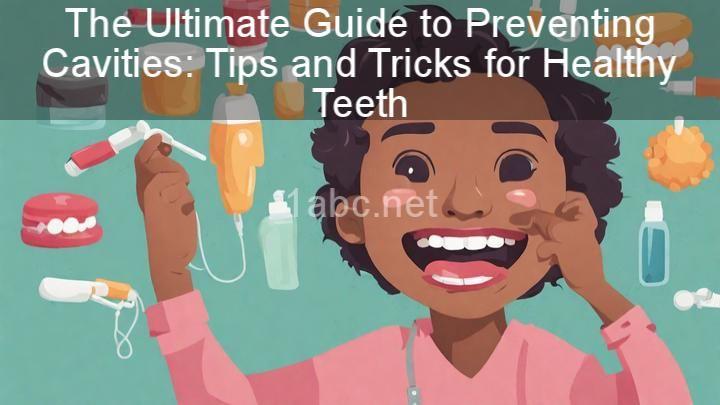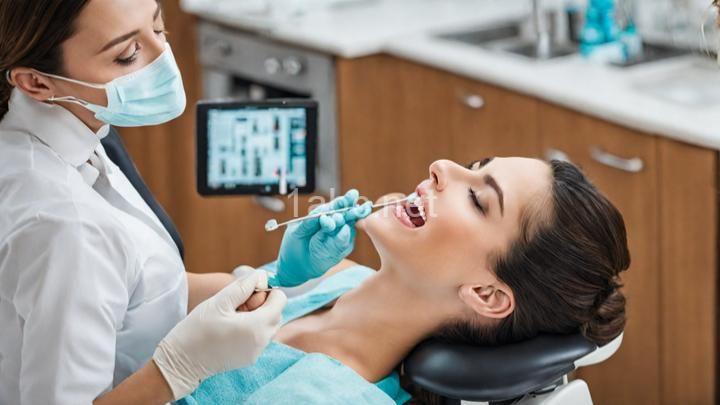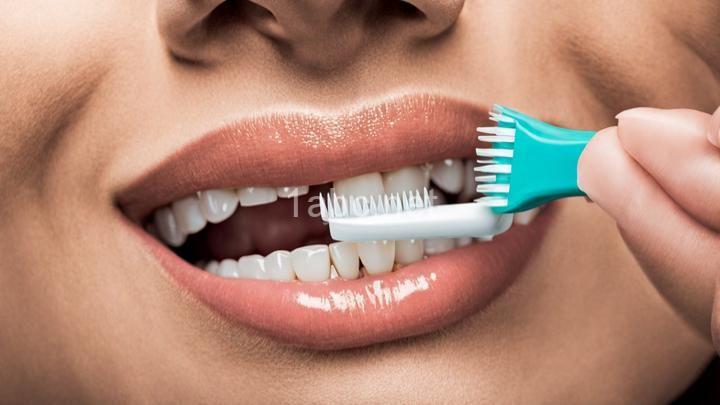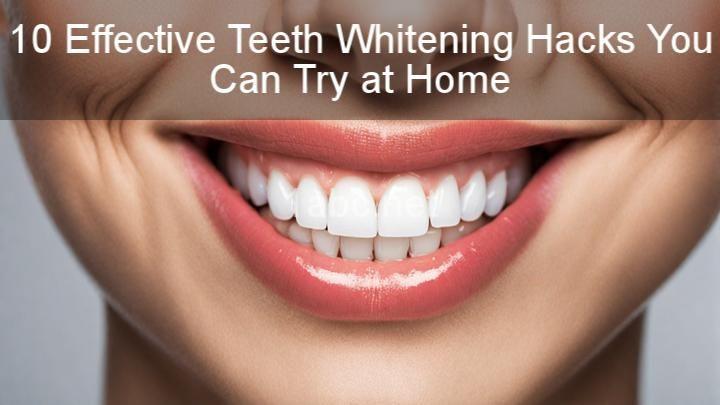The Ultimate Guide to Preventing Cavities: Tips and Tricks for Healthy Teeth

Introduction:
Welcome to our ultimate guide on preventing cavities and maintaining healthy teeth. We all know that having a bright and beautiful smile is not just about aesthetics, but also about overall well-being. Taking care of our oral health is crucial for preventing cavities and ensuring that our teeth stay strong and healthy. In this blog post, we will provide you with a comprehensive guide on how to prevent cavities, including daily oral care routines, choosing the right dental products, maintaining a cavity-friendly diet, regular dental check-ups, and additional tips and tricks. So let's dive in and discover how to keep our teeth cavity-free!
Section 1: Understanding Cavities
Cavities, also known as dental caries, are decayed areas in the teeth that result from a combination of factors. They occur when bacteria in the mouth produce acids that attack the tooth enamel, the hard outer layer of the tooth. The acids, along with plaque, a sticky film of bacteria and food particles, create an environment where cavities can form. Additionally, frequent consumption of sugary foods and drinks can contribute to the formation of cavities, as the bacteria in the mouth feed on the sugars and produce acids.
The good news is that preventing cavities is entirely possible with proper care and attention to oral hygiene. By understanding the causes of cavities, we can take the necessary steps to prevent them and maintain healthy teeth.
Section 2: Daily Oral Care Routine
Maintaining a daily oral care routine is the foundation for cavity prevention. Here is an ideal daily oral care routine that you can follow:
Brushing Techniques: Use a soft-bristled toothbrush and fluoride toothpaste to brush your teeth at least twice a day. Brushing should be done for a minimum of two minutes, covering all surfaces of the teeth, including the front, back, and chewing surfaces. Remember to brush gently, applying light pressure to avoid damaging the tooth enamel.
Flossing Methods: In addition to brushing, flossing is essential for removing plaque and food particles from between the teeth and along the gumline. Traditional dental floss can be used, but there are also alternatives such as interdental brushes or water flossers, which can be more convenient for some individuals. The key is to floss at least once a day to ensure thorough cleaning.
Mouthwash Recommendations: Incorporating a mouthwash into your routine can provide additional protection against cavities. Choose a mouthwash that contains fluoride, as it helps strengthen the tooth enamel and fight against tooth decay. Rinse your mouth with mouthwash after brushing and flossing for optimal results.
Tongue Cleaning Benefits: Don't forget about your tongue! Cleaning your tongue regularly can help reduce bacteria buildup, improve breath freshness, and promote overall oral health. You can use a tongue scraper or a toothbrush with a tongue cleaner on the back to gently remove bacteria and debris from the surface of the tongue.
Section 3: Choosing the Right Dental Products
Selecting the right dental products is crucial for cavity prevention. Here are some tips to help you make the right choices:
Toothbrushes: When choosing a toothbrush, consider the bristle type, size, and the American Dental Association (ADA) approval. Soft-bristled toothbrushes are recommended as they are gentle on the gums and tooth enamel. The size of the toothbrush head should comfortably fit in your mouth, allowing you to reach all areas of your teeth. Look for the ADA seal of approval to ensure that the toothbrush has passed safety and effectiveness standards.
Toothpaste: Opt for toothpaste that contains fluoride, a mineral that helps strengthen the tooth enamel and prevent cavities. Check for the ADA seal of acceptance on the packaging to ensure that the toothpaste has been tested and proven to be safe and effective. There are also toothpaste options available for specific concerns such as sensitive teeth or gum health, so choose one that suits your needs.
Dental Floss or Alternatives: Traditional dental floss is a common choice for cleaning between the teeth, but there are other options available as well. Interdental brushes, which are small brushes designed to clean between the teeth, can be a convenient alternative for those who struggle with traditional flossing. Water flossers, which use water pressure to clean between the teeth, can also be effective. Experiment with different options to find what works best for you.
Section 4: Maintaining a Cavity-Friendly Diet
Our diet plays a significant role in our oral health and cavity prevention. Here are some tips for maintaining a cavity-friendly diet:
Impact of Diet on Oral Health: The food and drinks we consume have a direct impact on our oral health. Sugary foods and drinks, such as candies, sodas, and cakes, can contribute to the formation of cavities. The bacteria in the mouth feed on the sugars and produce acids that attack the tooth enamel. Additionally, acidic foods and drinks, like citrus fruits and carbonated beverages, can erode the enamel and make the teeth more susceptible to cavities.
Foods to Avoid or Limit: To prevent cavities, it is best to avoid or limit the consumption of foods and drinks that are high in sugar or acidity. This includes sugary snacks, candies, sodas, fruit juices, and sports drinks. If you do indulge in these treats, try to consume them in moderation and follow up with proper oral care.
Tooth-Friendly Alternatives: Instead of reaching for sugary snacks, opt for tooth-friendly alternatives such as fresh fruits, vegetables, and dairy products. Fruits and vegetables are not only nutritious but also help stimulate saliva production, which plays a crucial role in neutralizing acids and protecting the teeth. Dairy products like cheese, yogurt, and milk are rich in calcium and promote strong teeth and bones.
Section 5: Regular Dental Check-ups & Professional Treatments
While daily oral care routines are essential, regular dental check-ups are equally important for cavity prevention. Here's why:
Importance of Regular Dental Check-ups: Regular dental check-ups allow for early detection and prevention of cavities. During these visits, your dentist will thoroughly examine your teeth and gums, looking for signs of decay or any other oral health issues. They may also perform professional cleanings to remove any hardened plaque or tartar that cannot be removed through regular brushing and flossing.
Professional Treatments for Cavity Prevention: In addition to regular check-ups, your dentist may recommend professional treatments to further prevent cavities. Dental sealants, which are thin coatings applied to the chewing surfaces of the back teeth, act as a barrier against bacteria and acids. Fluoride treatments, which involve applying fluoride varnish or gel to the teeth, help strengthen the tooth enamel and make it more resistant to decay.
Addressing Common Concerns: It is common for individuals to have anxieties or concerns about dental visits. If you're feeling nervous, remember that your dentist is there to help you and ensure your comfort. Communicate your concerns with your dentist, and they will do their best to address them. Many dental offices also offer sedation options for those who experience dental anxiety.
Section 6: Additional Tips and Tricks
Here are some additional tips and tricks for cavity prevention:
Drinking Water: Drinking water throughout the day helps rinse away bacteria and acid in the mouth, promoting oral health. Make it a habit to drink water after meals or snacks, especially if you cannot brush your teeth right away.
Chewing Sugar-Free Gum: Chewing sugar-free gum that contains xylitol can help increase saliva production, which neutralizes acids and helps wash away bacteria. Xylitol has also been shown to reduce the risk of cavities. Keep a pack of sugar-free gum handy for those times when brushing is not possible.
Avoiding Harmful Habits: Habits such as smoking or excessive alcohol consumption can negatively impact oral health and increase the risk of cavities. Quitting smoking and reducing alcohol intake can significantly improve your dental health.
Conclusion:
In conclusion, preventing cavities and maintaining healthy teeth requires consistent oral care and attention. By understanding the causes of cavities, following an ideal daily oral care routine, choosing the right dental products, maintaining a cavity-friendly diet, and scheduling regular dental check-ups, you can significantly reduce the risk of cavities and enjoy a lifetime of healthy teeth. Implement these tips and tricks into your daily routine, and remember, a beautiful and healthy smile starts with a commitment to oral hygiene!
FREQUENTLY ASKED QUESTIONS
What is The Ultimate Guide to Preventing Cavities: Tips and Tricks for Healthy Teeth?
The Ultimate Guide to Preventing Cavities: Tips and Tricks for Healthy Teeth is a comprehensive resource that provides valuable information and strategies to promote good oral health and prevent cavities. It covers various aspects including oral hygiene practices, diet and nutrition, fluoride usage, dental visits, and other preventive measures. This guide aims to educate individuals about the importance of maintaining healthy teeth, offering practical tips, and suggesting effective techniques to avoid cavities. It serves as a valuable resource for individuals of all ages who are interested in taking proactive steps towards achieving optimal oral health.
How can this guide help me prevent cavities?
This guide can provide you with helpful information and tips to prevent cavities. It may include recommendations such as:
- Brushing your teeth at least twice a day with fluoride toothpaste.
- Flossing daily to remove plaque and food particles.
- Limiting your intake of sugary foods and beverages, as they can contribute to cavity formation.
- Visiting your dentist regularly for check-ups and professional cleanings.
- Using fluoride mouthwash or rinses as directed by your dentist.
- Considering dental sealants, which are protective coatings applied to the chewing surfaces of the back teeth.
By following these practices and adopting good oral hygiene habits, you can reduce the risk of cavities and maintain good dental health.
Are the tips and tricks provided in this guide suitable for all ages?
Yes, the tips and tricks provided in this guide are suitable for all ages. They are designed to be helpful and applicable to a wide range of individuals, regardless of age. Whether you're a young learner, a student, an adult, or a senior, you can benefit from the advice and suggestions in this guide.



